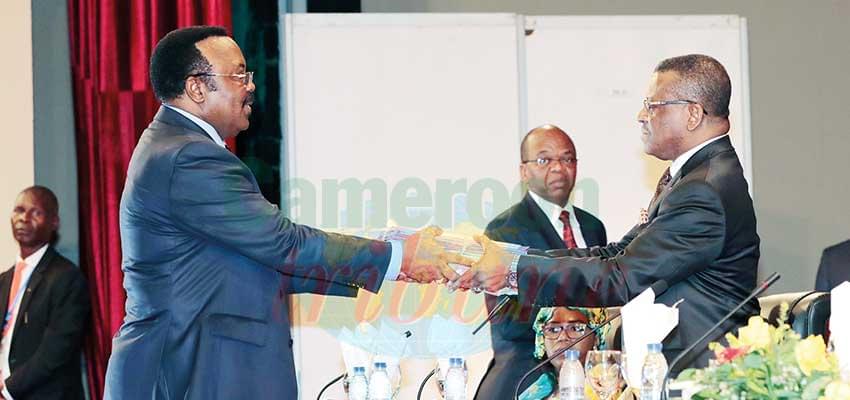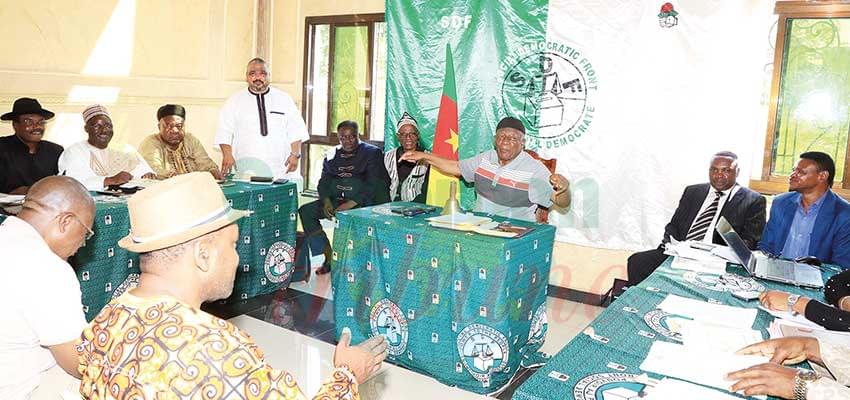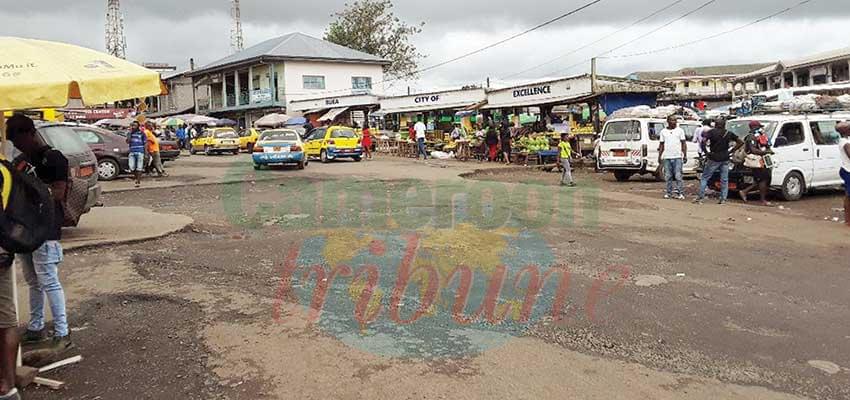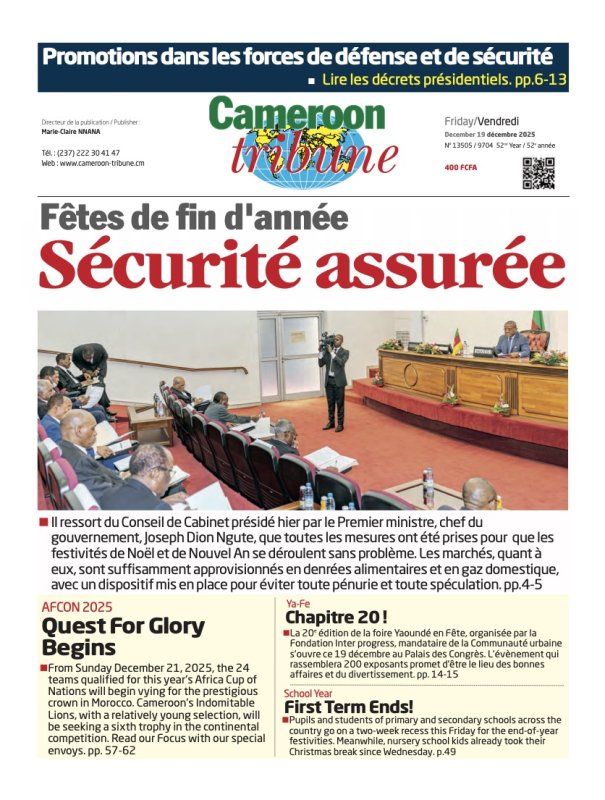Major National Dialogue : Recommendations to Restore Peace, Stability and Development

Below is the report of the Rapporteur General of the Major National Dialogue.
“On the esteemed instructions of the Head of State, His Excellency President Paul Biya, Convening Authority, the Major National Dialogue held in the Yaounde Conference Centre, from 30th September to 4th October 2019, under the chairmanship of H.E. Chief Dr Dion NGUTE, Prime Minister, Head of Government.
As a prelude to the dialogue proper, the Prime Minister, Head of Government, held pre-dialogue consultations with the view to determining not only the most suitable framework for this Dialogue, but also to solicit contributions and opinions from a broad spectrum of Cameroonians including those who continue to perpetrate acts of violence and terror across the country, notably in the South West and North West Regions.
The public responded positively to the Head of State's call for National Dialogue and the restoration of peace as witnessed in the continuous stream of delegations comprising lawyers, teachers, civil society actors, political leaders, religious authorities, trade union officials, student organisations and independent personalities who were received by the Prime Minister.
Concurrently, the Government dispatched renowned civil society personalities to meet with the Diaspora in an effort to engage them in the restoration of peace and security in the fatherland. These visits served to further demonstrate the great commitment of the Head of State. H.E President Paul BIYA to involve Cameroonians residing overseas in the search for a lasting solution to the raging crisis in the afflicted Regions.
Governors of the ten (10) Regions also engaged with inhabitants of their area of command to review all possible ways of making inputs to the process. For the Governors of the South West and North West Regions, the challenge was daunting for they had to contend with displaced populations, ghost town operations and armed militia. The objective was to provide incentives for armed activists to cease insurgent operations and benefit from the government program on disarmament, demobilisation and reintegration in the centres of their Region. Furthermore, it was hoped that through public sensitisation, communities, particularly the youth who had fled into the forest, could return to their villages and towns.
Cameroon's diplomatic missions likewise invited our compatriots for brainstorming sessions aimed at generating contributions which would enrich the deliberations in the Major National Dialogue.
Some of these contributions were only a few lines while others were in the hundreds of pages. A sociological breakdown of these contributions reveals that wide sections of the Cameroon population and stakeholders in conflict zones weighed in.
These contributions concerned losses suffered by students, parents, businessmen, medical and health personnel, civilians military personnel as well as Cameroonians.
Worthy of note is the fact that recurrent themes in the contributions received by the Secretariat resonate in many ways with the content of the speech of the Head of State delivered on 10 September 2019.
From 30 September to 4 October 2019, 600 participants were invited by the Prime Minister, Head of Government, Chairperson of the Major National Dialogue, following the pre-dialogue consultations. Participants split into various Commissions which were generally composed of a bureau with a President, vice presidents and rapporteurs. As instructed by the Chief Convenor, the Head of State, H.E Paul BIYA, two-thirds of the participants were drawn from the North West and South West Regions while about 5 came from the Diaspora.
The dialogue was, as per the guidelines contained in the Message of the Head of State of 10 September 2019 convening the Major National Dialogue, carried out in plenary and Commission breakout sessions.
The opening of the Major National Dialogue started with oecumenical prayers, led by:
Imam Cheikh Oumarou, Pasteur Gustave Ebai, Pasteur Alain Ruben NGWET, Monseigneur Jean MBARGA.
It was followed by a welcome address by the Government Delegate to the Yaounde City Council, Gilbert Tsimi EVOUNA, and messages from ex-combatants, from the DDR Centre, most prominent amongst which was that delivered by Kawa Kawa Yannick.
Thereafter, the Prime Minister, Head of Government and Chairperson of the Major National Dialogue:
- welcomed the holding of this Major National Dialogue;
- According to him, the consultations he held prior to this Major Event enabled him to realise the ardent desire by Cameroonians from all walks of life, for a return to peace in our country, the recovery of economic activities in the two Regions and a generalised social appeasement.
- He urged participants to show proof of patriotism and responsibility throughout the duration of the Dialogue, given the myriad expectations of Cameroonians in this connection.
- He recalled that the social and security context in the North-West and South-West, as well as in other Regions, especially in the far-North Region, is affecting all aspects of the life of our country. Thus, and in his own words, this suffering and these difficulties have been affecting us all, and together shall we find solutions through dialogue.
Keynote speakers at the first plenary session that followed included:
H.E. Peter Mafany Musonge,
H.M Nfon Mukete, H.M. Rene Ze Nguele
H.M. Boubakary Abdoulaye, Chairman Ni John Fru Ndi, H.M. Sadou Boukar,
H.M. René Effa
Madam Fadimatou Iyawa, Dr. Simon Munzu
Sultan Ibrahim Mbombo Njoya
His Eminence Christian Cardinal Tumi, Madam Calixte Beyala,
Chief Dr. Atem Ebako
Most of the keynote speakers decried the senseless violence, killings kidnappings, destruction of public property and livelihoods, and called on the participants to set aside their differences and political party affiliations to work for peace and normalcy to return to our beloved fatherland.
In this regard, keynote speakers stressed the fact that we are sons and daughters of:
a territory whose overall boundaries were set, not by us, but by foreign powers in treaties which we were not part of; a territory which was divided into two zones of unequal sizes, again under terms of treaties between foreign powers to which we were not parties; a territory in which two foreign cultures were grafted one on each of the two zones as delimited by foreign powers on existing indigenous cultures, with each foreign culture being raised to a national status.The sons and daughters of these two parts could have remained definitely apart if the people of one part had not chosen, in February 1961, to forge a new nation with the people of the other.
This decision to come together and form a new nation was the single event in our history which we should be most proud of, because unlike the previous other developments in the constitution of our nation, this one was not decided by foreign powers, but by us Cameroonians.
This explains the need to remain faithful to our initial intent to make our bilingual and bicultural heritage be of equal status, instead of an obstacle to our development.
Keynote speakers emphasised on organisational forms like decentralisation, federation and confederation.
However, it was a common understanding that placing political science labels on the Cameroonian nation was not as vital as the content given to the form of power sharing with the Regions.
It was also a common view that the responsibility to address these issues was primarily that of the Cameroonian people even if the constructive support of our partners could be required at certain moments.
The common thread running through the general discourse was that, as Cameroonian minds, we need to collectively tone down the rhetoric and work towards ending the suffering of our people and return normalcy to their lives and livelihoods.
Your Excellencies, Ladies and gentlemen, the participants brainstormed on Eight (8) main themes highlighted in the message delivered by the Head of State, namely:
1- Bilingualism, Cultural Diversity and Social
Cohesion
2- Educational System
3- Judicial System
4- The Return of Refugees and Internally
Displaced Persons
5- Reconstruction and Development of
Conflict-Affected Areas
6- Disarmament, Demobilisation and
Reintegration of Ex-Combatants
7- Role of the Diaspora in the Crisis and in the
Country's Development
8- Decentralisation and Local Development.
The enthusiasm for the Dialogue could be seen in the quality of participants - spanning actors of the political, administrative, religious, traditional, private and civil society sectors of our society as well as their effective presence from the beginning through the end of the process.
The dialogue process was free, fair, transparent and sometimes passionate- a reflection of the vitality and keen interest that Cameroonians have in addressing the plight that has befallen our country in its most recent history.
Participants within the Commissions largely determined their procedures for deliberations and the outcome was a true restitution of their concerns, preoccupations, anxieties and most importantly their hopes for a better future for all Cameroonians.
Ladies and Gentlemen, Dear Participants,
At this juncture, permit me highlight some of the major Recommendations that emerged from proceedings of the various Commissions:
1- BILINGUALISM, CULTURAL DIVERSITY
AND SOCIAL COHESION/BILINGUISM,
DIVERSITE CULTURELLE ET COHESION SOCIALE
Enhancing the practice of Bilingualism in all segments of society through the creation and implementation of programs starting from preschool ages; Enrooting Cultural Diversity through a strict implementation of regional balance and equitable access to public service and security forces; Conceive and implement a curriculum on Inter Community Fellowship, Rebuilding Fraternal Trust and Civic Engagement in an effort to strengthen National Social Cohesion. Pass legislation that spells out the equitable use of both official languages in all areas of national life; Develop and codify principles for social dialogue, social cohesion and living together.2- EDUCATIONAL SYSTEM/SYSTEM EDUCATIF
Ensure that educational reforms integrate the need to keep the two educational subsystems afloat, buoyant and futuristic, recognising the unique strengths and specificities of each subsystem, building on the strengths of each one to train well rounded and excellent Cameroonian graduates who will excel wherever they go Ensure that Teachers' Trade Unions should work in collaboration with the Government Regulate the proliferation of Teachers Trade Unions and promote better organisation of the Trade Unions to ensure synergy from the regional to national level.
3- JUDICIAL SYSTEM/SYSTEME JUDICIARE
• translate ail legal instruments into both official languages and ensure their simultaneous publication in both official languages;
• take into account the prerequisite of English language proficiency and the mastery of the Common Law legal system when deploying judiciary staff to the North-West and South-West Regions;
• set up a Law School for training lawyers and ail legal practitioners at large in Cameroon;
• upgrade the Common Law Section of the Supreme Court of Cameroon into a fully fledged Legal Bench comprising all sections dealing with specific matters of the Common Law;
• improve mechanisms for legal cooperation in view of commencing proceedings to call to book those financing terrorism from foreign countries;
4- The Return of Refugees and Internally
Displaced Persons
The State should set up communication channels for a better deployment of the army and freer movement of the people, as well as take measures for the construction of decent homes for displaced persons;
Take measures geared towards granting general amnesty to foster the return of refugees and internally displaced persons;
proceed to the physical headcount of ail displaced persons and come up with an estimate of their basic socio-economic needs (schools, health facilities, accommodation ... );
Provide 'resettlement and reintegration kits' to refugees and internally displaced persons;
5- Reconstruction and Development of
Conflict-Affected Areas
To formulate a vast Programme for the Recovery, Reconstruction and Dev...
Cet article complet est réservé aux abonnés
Déjà abonné ? Identifiez-vous >
Accédez en illimité à Cameroon Tribune Digital à partir de 26250 FCFA
Je M'abonne1 minute suffit pour vous abonner à Cameroon Tribune Digital !
- Votre numéro spécial cameroon-tribune en version numérique
- Des encarts
- Des appels d'offres exclusives
- D'avant-première (accès 24h avant la publication)
- Des éditions consultables sur tous supports (smartphone, tablettes, PC)













Commentaires